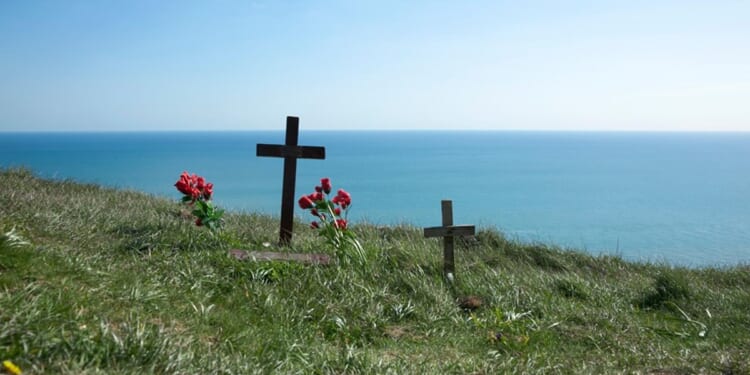IN THE late 1980s, I wrote a biography of G. K. Chesterton — an intensely original and genuinely important author and journalist, who, in many ways, is more relevant today than in his lifetime (he died in 1936). But beware heroes. The author of The Everlasting Man, the Father Brown Stories, The Napoleon of Notting Hill, numerous biographies, and volumes of compelling journalism didn’t always speak wisdom and goodness. Witness, for example, his occasional dives into anti-Semitism.
He also wrote this: “Not only is suicide a sin, it is the sin. It is the ultimate and absolute evil, the refusal to take an interest in existence; the refusal to take the oath of loyalty to life. The man who kills a man, kills a man. The man who kills himself, kills all men; as far as he is concerned, he wipes out the world.”
The style is quintessential Chesterton, but the sentiment is historic, outlined in ancient Jewish thought as well as by the church Fathers. And there was a time, not so long ago, when most Churches shared it. Frankly, so did I — until reality and exposure muddied the waters of religious certainty, and the sacrament of experience kicked in.
MY FIRST encounter with suicide was when one of my university professors (who, I think, tried to recruit me into the security services) took his own life. He was a government adviser, enormously respected, with a loving family and many close friends. I wasn’t close enough to the man to know all of the details, but someone who was told me: “It was a release. Perhaps he can be happy now.”
Something similar was said about Stephen Godfrey, a leading journalist in Canada, to which I moved in 1987 after marrying a Canadian. Godfrey interviewed me for a newspaper profile, and the conversation was gentle and informed.
Two days later, the arts editor of the paper phoned me to explain that my profile would run the following day, but that I should know that Stephen Godfrey’s obituary would also appear. I suppose I was one of the last people he spoke to, and that thought has never left me. I was told that he had struggled for a long time, and saw suicide as a victory over the grasping darkness that would never leave him.
FROM 20 years of never knowing of someone who had ended their life, and in an age when it was one of many taboos not discussed, suicide now seemed to be all around me: a young man full of promise, and with a powerful intellect; a book reviewer, admired by many, who formed a suicide pact with his wife; and the poor woman who woke from her pill overdose to find her dead husband, a successful businessman whom I had last seen in his luxurious home, seemingly so hungry for life.
Then came ordination and the repeated funerals — usually of the elderly and ill, but not always. I’ll never forget the man in his seventies, weeping and blaming himself for the death of his granddaughter. The family had known that the girl was struggling with depression, and had done all that they could; but what we learn in such cases is that people in that grim pit of hopelessness will always find a way. The grandfather could not erase the memory of being stopped by the police on the day that she died.
Or the fit, strong, 35-year-old military veteran who had performed terrifying work in the armed forces. The funeral was packed with family and former comrades, but nobody would discuss the cause of death. This macabre but understandable pretence made it all seem so incomplete and unclosed.
CHESTERTON had a point, but he did not draw the most appropriate Christian conclusions. When someone takes their own life, they do, in a way, wipe out the world — not because they hate or fear it, but because, in their eyes, the world hates and terrifies them. Waking moments are full not of hope or joy, but dread and pain. Would the God of love and understanding truly reject those who want to wipe out what is seen as causing them such agony?
It is, thank God, impossible for most of us to comprehend fully what it must be like to prefer non-existence to existence. Some leaps of empathy should, must, be beyond us. But we have to try to expunge the shame around suicidal thoughts, enabling those who have them — and the numbers are hideously high — to share them, and to look for help.
In recent years, I’ve known two people who have been close to suicide, but were willing to discuss it, accepted the help of a psychiatrist, and, with a combination of therapy and education, are leading gloriously ordinary lives. “I know I was in that place,” one of them said to me recently, “but now I can’t understand why. It seems so far away and so long ago.”
I AM not qualified to provide a theological and certainly not a medical analysis of the subject. Any Christian, of whatever denomination, knows that attitudes to many issues have changed, and that one of those issues is suicide; but religious and social stigma still exists. The narrative is twisted by the assisted-dying movement, which, at its ideological centre, often projects a worrying ambivalence about the dignity of life, as well as the “normality” of suicide. Combine that with sordid cults, particularly among teenagers, and the plague of loneliness, and the problem is acute and immediate.
Listen to people, ask questions, be aware of signs and signals: if a friend or relative seems “a bit low”, don’t just assume that it’s an “off” day. Educate yourself (there are numerous helpful websites and organisations) and be available.
And to those seeing the curtains close ever more tightly, and the light so difficult to feel, I would say: Know that you’re not alone, and that help is out there. And God be with you.
The Revd Michael Coren is a priest in the Anglican Church of Canada and a journalist.

















